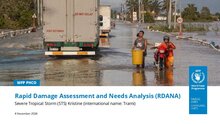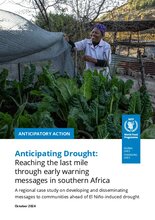
WFP demonstrated flexibility, diversity and agility in responding to this complex health crisis, engaging in new non-traditional partnerships in the health, private, logistics and communications sectors. The evaluation concluded that WFP’s two-pronged response of food assistance and common service support, was appropriate and relevant, efficiently scaling-up amidst rapidly evolving needs. WFP successfully filled a logistics capacity gap of the humanitarian community, and its food assistance contributed to the containment efforts.
The evaluation makes 5 recommendations geared to: improve performance by strengthening internal policies, guidelines and systems in emergency preparedness and response, human resources, and monitoring; capture and promote WFP’s best practices; sustain engagement in global supply chain initiatives; adopt a comprehensive and collaborative approach to national stakeholders’ health crisis response capacity strengthening; and reinforce accountability to beneficiaries.



